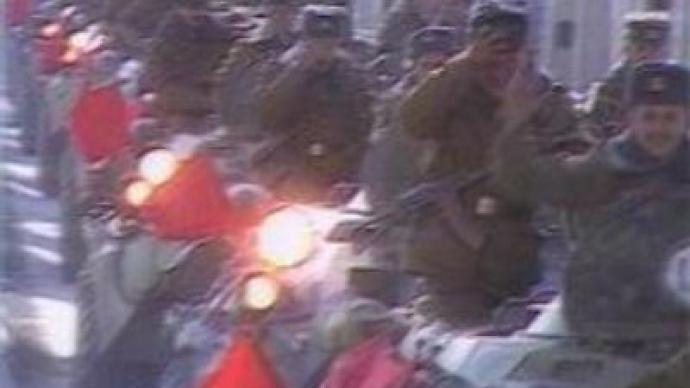18 years since Soviet pull-out of Afghanistan

Russia marks the 18th anniversary of the Soviet pull-out from Afghanistan. More than 14,000 troops died and nearly half-a-million were wounded during the nine-year conflict.
The withdrawal of Soviet troops from Afghanistan in February 1989, after 10 years of war, was regarded by many as an embarrassing retreat. After the Soviets left, the country gradually slipped into tribal war and ended up as a harbour for international terrorists. It was not until the fall of the Twin Towers in 2001 and the subsequent U.S.- led military operation in Afghanistan, that the Soviet combat and intelligence experience in the country has been better appreciated.In 1989, at the CIA headquarters, Director William Webster and his ‘Afghan team’ celebrated what they called the greatest victory of the Cold War. On that day, February 15, 1989, Soviet troops moved across the Amudarya River from Afghanistan back to the USSR.The Washington Post former editor Steve Coll in his book ‘Ghost Wars’, tracked the paper trail of the CIA proxy war in Afghanistan that fueled Islamic militancy and gave rise to Al Qaeda.There is no ‘plausible denial’ that back in 1979 the CIA masterminded a multi-billion covert operation to turn Afghanistan into insurgency incubator, to threaten the Soviet Union's national security. However, the Agency failed to realise that the “hydra” they had created would turn on the master with vengeance. The major consequence of the Soviet 40th Army withdrawal was that nobody cared about Afghanistan any more, except for nascent Taliban and Al Qaeda. First, the country slid into tribal warfare, and then evolved into sanctuary for global terrorism that detonated on 9/11.Shortly after the Twin Towers disaster, the U.S. forces swooped on Afghanistan to fill the vacuum left by the Soviets and exploited by local warlords and international jihadists. Suddenly, the Soviet experience in Afghanistan, in addition to historical and academic reasons, rekindled a practical interest as a counter-insurgency operation. In the heat of the Cold War, the Soviet campaign in Afghanistan was called in the USSR “an international duty”. The rest of the world, however, saw it as an aggression or invasion. The Pentagon was the first to appreciate the Soviet military experience. In their internal correspondence, classified at that time, the CIA and DIA refer to Soviet military presence as “counter-insurgency”.At the time of the conflict, Afghanistan had a central government which remained in power more than two years after the pull-out of Soviet troops. Even after the collapse of the USSR, the government in Afghanistan still had the situation under control. The Soviet Army, though, conducted more than just military operations. ‘We controlled all the major towns. But after nine years we realised it couldn't last forever. Of course, we also built up the Afghan army, and police, we held elections, which I would say were largely democratic. Besides that, besides sending the troops, the Soviet Union also built factories, schools, developed Afghan economy, and still some things constructed by the Soviet Union are functioning,’ the Russian Defence Minister, Sergei Ivanov, said. Unlike the Soviet Union, Russia does not border with Afghanistan. It is not going to send its troops to the country, but has been providing intelligence support for coalition forces since the beginning of their mission against Taliban and al Qaeda.
You can share this story on social media:












